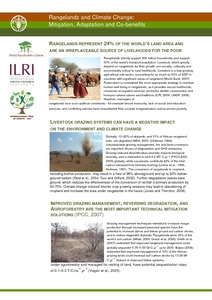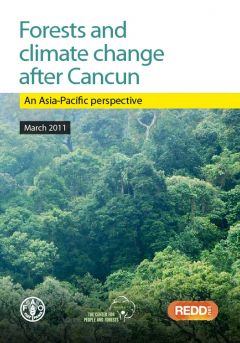Focal point
Location
The Food and Agriculture Organization of the United Nations leads international efforts to defeat hunger. Serving both developed and developing countries, FAO acts as a neutral forum where all nations meet as equals to negotiate agreements and debate policy. FAO is also a source of knowledge and information. We help developing countries and countries in transition modernize and improve agriculture, forestry and fisheries practices and ensure good nutrition for all. Since our founding in 1945, we have focused special attention on developing rural areas, home to 70 percent of the world's poor and hungry people.
Members:
Resources
Displaying 2651 - 2655 of 5074Innovations for securing women’s access to land in East Africa
Contains review of women’s access to land, research overview of women’s land tenure status in East Africa, harnessing women’s agency to secure women’s access to land, the role of intermediary institutions in increasing women’s land tenure security.
COMMUNAL TENURE AND THE GOVERNANCE OF COMMON PROPERTY RESOURCES IN ASIA
Summary: "This paper presents an overview of the distinctive
features of communal tenure in
different community-based land and natural resource
management systems. Communal
tenure refers to situations where groups, communities, or one or more villages have
well defined, exclusive rights to jointly own and/or manage particular areas of natural
resources such as land, forest and water. These are
often referred to as
common pool
resources: many rural communities are dependent on these resources for their
Rangelands and climate change: Mitigation, adaptation and co-benefits
Forests and Climate Change After Cancun: An Asia-Pacific Perspective
The United Nations climate change talks in Cancun changed the shape of REDD+ negotiations and global forest policies. What effect will the decisions from the talks have on forests and forest users in Asia and the Pacific? Eleven climate change and forestry experts gathered to reflect on these issues, and this booklet summarizes their responses to 12 key questions.
If women hold up half the sky, how much of the world’s food do they produce?
This paper explores, conceptually and empirically, the question of how much food is produced by women. Data for labour inputs and agricultural output are used to assess women’s contribution to food and agricultural production. The study also assesses gender differences in productivity. The paper finds that a precise measure of women’s contribution to food production is impossible to establish. In general women do not produce food separately from men and it is impossible to disaggregate men and women’s contributions either in terms of labor supplied or in terms of output produced.











